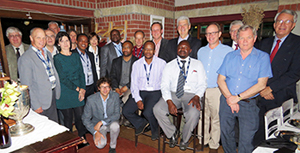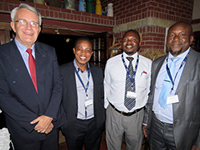
Participants in the multidisciplinary conference hosted by the UFS Faculty of Theology, celebrated the 35th anniversary of the faculty with a festive dinner. |
The Faculty of Theology at the University of the Free State (UFS) held a multidisciplinary conference from 24 to 26 August 2015, with the theme of ‘Re-thinking justice and righteousness in society’. A total of 26 papers were presented at the congress, with contributions from Theology, Economic and Management Sciences, the Humanities, and Law. Delegates from Nigeria, Zimbabwe, Zambia, and Belgium attended the conference, in addition to academics from the UFS.

Some of the keynote speakers at the international conference hosted by the UFS Faculty of Theology, ‘Re-thinking justice and righteousness in society’: Prof Fanie Snyman, Dean of the UFS Faculty of Theology, Rev Peter Awojobi, Rev Menard Musendekwa and Prof Ango Samuel. |
“With this conference,” said Prof Fanie Snyman, Dean of the UFS Faculty of Theology, “we are positioning the faculty alongside other faculties whose insights and disciplines are important to Theology. A multidisciplinary forum also provides great possibilities for
cooperation across disciplines.”
The conference coincided with a visit to the UFS by students in the theological faculties at the Universities of Stellenbosch and Pretoria. These students attended some of the presentations, in addition to the other activities they were involved in.
The Faculty of Theology is celebrating its 35th anniversary this year, making it not only the youngest faculty at the UFS, but also the youngest theology faculty in South Africa. In this time, the faculty has established itself as a significant role player within the theological landscape, with important agreements having been reached with theological institutions in Europe, the USA, and Africa.